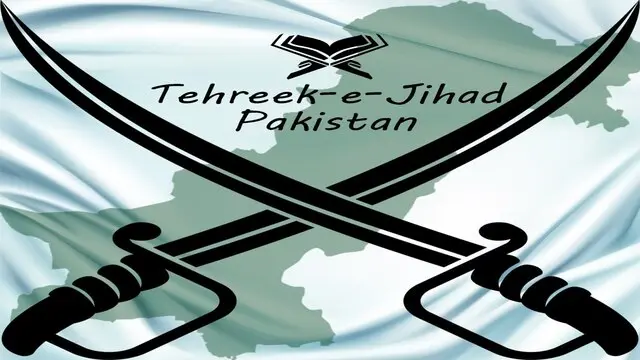Pakistan’s structural support to terrorism export inside India’s Jammu and Kashmir and across its contested border with Afghanistan continues to threaten its existence. Recently, an organisation called Tehreek-e-Jihad Pakistan (TJP) has propped up which has been claiming the responsibility for targeted attacks against Pakistani security forces.
The TJP has carried out a number of high-profile attacks, including one that killed 12 Pakistani soldiers in the restive province of Balochistan province in July this year.
What is Tehreek-e-Jihad Pakistan about?
The insignia of TJP shows a book over a rehal or tawla — typically a stand for keeping religious books — and a wrong map of Pakistan that falsely shows the Indian state of Jammu and Kashmir inside Pakistan, imposed over two swords.
Founded in February this year, the TJP named Maulana Abdullah Yaghistani as its emir and Mullah Muhammad Qasim as its spokesperson, according to the Middle East Media Research Institute (MEMRI)
On May 12, 2023, the TJP carried out an attack on a Pakistani army camp in northern Balochistan.
The military camp was of Pakistan’s paramilitary Frontier Corps (FC). In May, the group released photos of six men among those who attacked the FC camp in Balochistan.
What are Tehreek-e-Jihad Pakistan’s stated goals?
According to its founding statement published in February, Tehreek-e-Jihad is inspired by “Sheikh un Hind”, a reference to the third principal of Darul Uloom Deoband, a religious seminary in Deoband, in northern India’s Uttar Pradesh state.
TJP said that “the objective for which the movement of Sheikh-ul-Hind emerged was destroyed after the independence of Pakistan.”
It must be noted that Deobandi movement was initiated to restore the key tenets of Islam in Muslim life. At the onset in 1866, its goal was also to fight the British with greater strength after Indian subcontinent failed to free itself from British colonial rule during 1857 revolution. Therefore, in political sense, the Deobandi religious leaders remained staunchly anti-colonialist. But within Islam, they asserted themselves as the revivalists who intended to purify the practice of Islam.
Across the Af-Pak region’s vast jihadist landscape, the restoration of key tenets of Islam and fighting the colonial power, remains the dual goals of armed groups who claim to be inspired by the Deobandi movement.
Here, TJP’s statement reflects that they see the state of Pakistan as a purported colonial force on the land.
“We have reached the conclusion that except through armed jihad, the enforcement of an Islamic system is not possible in Pakistan,” the TJP statement added, while announcing the establishment of the organisation.

